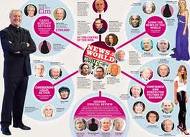 There were two hearings in the phone interception litigation this week before the assigned judge, Mr Justice Vos. At the first, on Monday 27 June 2011, he approved an order requiring the Metropolitan Police to give extensive disclosure of documents which they seized from private investigator, Glenn Mulcaire by 8 August 2011. The Guardian reported that the documents covered by the judge’s order were mainly limited to billing data, details of contracts, invoices and payments made to the private investigator, and further pages from his notebooks.
There were two hearings in the phone interception litigation this week before the assigned judge, Mr Justice Vos. At the first, on Monday 27 June 2011, he approved an order requiring the Metropolitan Police to give extensive disclosure of documents which they seized from private investigator, Glenn Mulcaire by 8 August 2011. The Guardian reported that the documents covered by the judge’s order were mainly limited to billing data, details of contracts, invoices and payments made to the private investigator, and further pages from his notebooks.
Then, on Friday 1 July 2011, Mr Justice Vos heard the third in the series of “Case Management Conferences”. The development which attracted most media attention was the replacement of the settled claim brought by sports commentator Andy Gray as a lead case with the claim brought by former England footballer, Paul Gascoigne. The “Independent” reported Mr Gascoigne’s lawyers as saying that phone hacking had added to his psychological trauma. At the same hearing, the Judge gave directions for the trial of the lead cases and generic issues. News Group agreed to give the claimants disclosure of documents in relation to the “generic issues” in the actions – those concerning the nature and extent of the phone hacking “scheme” and the identity of those involved.
Meanwhile, the officers of the new police phone hacking investigation, Operation Weeting, have been busy. Over the past 5 months, officers have been systematically contacting the victims of the phone hacking operation conducted by Glenn Mulcaire and the News of the World. There have now been five arrests of journalists associated with the “News of the World”. Three arrests in April were followed by a fourth on 23 June 2011 – of a freelance journalist named Terenia Taras (see our post here). On Monday 27 June 2011 there was a fifth arrest – reported by the Metropolitan Police as being of a 34 year old woman, named as Laura Elston, a former royal correspondent of the Press Association news agency. She was later released after being questioned by Operation Weeting officers. It was subsequently reported that Ms Elston had received the “full support” of her editors.
On Tuesday 28 June 2011, the Metropolitan Police Commissioner, Sir Paul Stephenson, gave evidence to the House of Commons Home Affairs Select Committee. He said that a “significant number” of the 45 officers working on Weeting were dedicated to answering requests for information in damages claims being brought by alleged victims of hacking. Sir Paul said:
“Would I wish those very experienced detectives were actually investigating robberies? Of course I would, but nevertheless it’s our responsibility, we’ve got to carry it out and we’ve got to get it right.”
There is a report of his evidence in the “Independent” under the headline “Phone hacking inquiry ‘drains police resources’”
Finally, the Guardian reports that News International has asked leading legal firm Olswang to draw up a new code of practice for the company in an effort to prevent a repeat of the phone-hacking affair at the News of the World. It quotes an email to staff from the News International chief executive, Rebekah Brooks, in which she said the affair would “continue to challenge us as a company from a reputational and resource perspective“, but added that News International had made “significant progress” on the issue over the last year. Ms Brooks told employees
“I am determined that NI is led in a way that deals with these matters properly. I want both external and internal acknowledgement that we have done the right thing – by facing up to our responsibilities where things have gone wrong and having done our utmost to correct them.”

